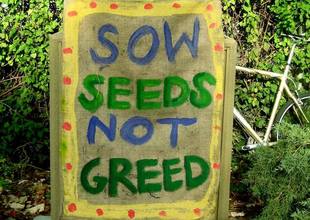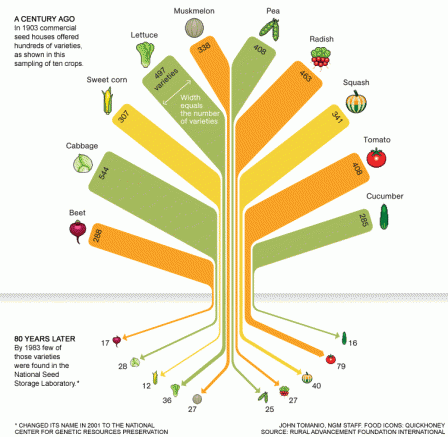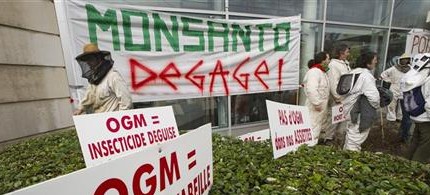A seed is a dense amalgam of bioinformation. SInce Darwin did his first experiment on seeds, they have also been subject to biopolitics in the most direct sense. As Monsanto and other corporations seek to privatize the genetic commons, it’s time to join the seed revolution.
Charles Darwin’s first published experiment was called “Does Sea Water Kill Seeds?” This apparently innocuous question concealed a major biopolitical contest. Darwin sought to prove whether or not seeds could germinate after being soaked in sea water. As he observed in his essay:
such experiments…have a direct bearing on a very interesting problem, which has lately, especially in America, attracted much attention, namely whether the same organic being has been created at one point or on several on the face of our globe.
Darwin spliced two related issues here: first, the debate prompted by British geologist Edward Forbes who asserted that Europe’s landmass had been far more extensive in the relatively recent past so as to account for the spread of plant varietals to islands like the Azores.
For the “common sense” of received science said that sea water killed all seeds. Therefore, if the same species was observed in different places, then it must have been “created” separately. Pro-slavery apologists used this argument to propose that there were distinct and different forms of the human species and it was therefore acceptable for white North Americans to enslave Africans.
Darwin’s simple test demolished the theory: seeds germinate perfectly well after an immersion in salt water, meaning that they could be disseminated by the ocean across the planet. Species thus originated once and not repeatedly. But other interesting questions opened:
But when the seed is sown in its new home, then comes the ordeal: will the old occupants in the great struggle for life allow the new and solitary immigrant room and sustenance?
Darwin’s language here is fascinating and provocative, showing that five years before the formal publication of Origin of Species, he was already thinking far down the road. His experiment did not, of course, demolish slavery’s logic but it removed one of its purported strands of “empirical evidence.”
Fast-forward to our own day, and the occupants are making very little “room and sustenance” for the “immigrants” in all senses. As the chart below shows, only 4% of the commercial vegetable varieties being grown in 1903 are still in cultivation today.
Whereas there were nearly 500 commercial varieties of lettuce in 1903, now we must choose from only 36–if you’ve ever wondered why your “Mesclun” always tastes the same, here’s your answer.
The reduction in variety is part of the effort to commandeer the food supply. Monsanto now controls 93% of the soybeans and 80% of the corn growth in the United States by its seed monopoly and produces 27% of all seeds sold. Many of these, especially the corn and soy, are genetically manipulated and have worked their way into the entire food chain.
Activists have had some signal successes against this monopoly in Europe where France and Hungary recently joined Germany, Austria, Peru and Luxemburg in banning GMO seeds. Hungary insisted that sprouted plants from genetically-modified seeds be thoroughly destroyed.
In the US, while the seed industry remains in charge, organizers have created a brilliant alternative strategy: the seed library. The seed library stocks seeds of all kinds, “lends” them to a library user, who then “returns” them once the crop is harvested. One of the founders of this movement was Gary Paul Nabhan, co-founder of Native Seeds/SEARCH.
Seed libraries are formal and informal, sometimes actually taking space in public libraries next to books as in Richmond, VA. The action combines two of the best internal projects of the Occupy movement: to offer nutritious, organic and non-genetically modified food to the Occupiers and others; and to create libraries.
On February 27, there is a day of action for Occupy the Food Supply. More exactly, following Darwin, the project is to un-occupy food, seeds and thereby our bodies. Their coalition of organic farmers, farm laborers, urban farmers, seed activists, librarians, foodies and all those concerned with personal health reaches far beyond the stereotype of Occupy.
Join them, support the action, plant heirloom seeds, join a seed library–it’s all fun and it’s all radical in the old sense: it goes to the root.




Pingback: Seeds of Democracy and the Smog of Law | Occupy 2012
Oops! Typo–my bad–but thanks for the great reference and keep up the fabulous work!
Thanks for your article. Quick correction, the seed library in the Richmond Public Library is in Richmond, CA (not Virginia); however, there are dozens sprouting up all over the country. Yeah! If you are interested in having a seed library in your community, check out our “Create a library” page at http://richmondgrows.org. We also have a list of “Sister libraries” under “Contacts.” Peas.